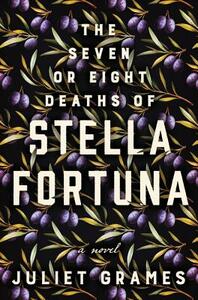Take a photo of a barcode or cover
I was torn on this book. The writing – excellent. The story telling skills – also excellent. This book pulled me in and had me engaged for ¾ of it. But then I began to suspect that there might actually be no point or even relief to the endless, relentless sorrow of Stella Fortuna’s life, and it became hard to force myself to finish it. I appreciate warnings of pregnancy loss/infant death because it is very traumatic for me if I am not expecting it, and both of these happen in this book. But take away my visceral reactions to those things, and I was still left feeling endlessly depressed and wondering what exactly the point was. I read heavy things often, but this felt so utterly *pointless* that I could not appreciate it.
This book contains senseless violence, sexual abuse, pregnancy loss, gore (which was often pointless and over the top), and a general miasma of depression. I truly loved the parts that immersed me in the Calabrian/Italian-American world that the author clearly knows so well, but I cannot say I liked this book or really recommend it.
Poor unfortunate Stella Fortuna.
This book contains senseless violence, sexual abuse, pregnancy loss, gore (which was often pointless and over the top), and a general miasma of depression. I truly loved the parts that immersed me in the Calabrian/Italian-American world that the author clearly knows so well, but I cannot say I liked this book or really recommend it.
Poor unfortunate Stella Fortuna.
Mariastella Fortuna is born in the tiny, poverty stricken, Calibrian mountain village of Ievoli. Born just after the First World War to Assunta and Antonia Fortuna, she is named for her dead sister - the sister who died from suspected Spanish Flu, brought back from the war by her good for nothing father. The father that leaves for America, when she is only a few weeks old, to make his fortune.
Antonio is more or less absent throughout Stella's childhood - only returning occasionally for brief visits home and to plant more children in his long-suffering wife's belly and terrorise his family. No one misses him when he is not there, although it would be nice if he actually sent money back to his wife to support their growing family.
Assunta bears three more living children as a result of Antonio's increasingly infrequent visits, another daughter, Concettina, and two younger sons. She does her best to support them any way she can and they are happy living their hard, simple lives - lives they understand.
Stella loves her mother and sister deeply. Her father is another matter. As the oldest child, Stella is witness to the tyranny Antonia inflicts upon them all during his visits, and is disgusted by the way makes sexual demands on, and degrades, their mother. Stella has no wish to become a wife and live the life her mother lives. She vows she will never marry and have children.
Stella is beautiful, intelligent, unconventional and fiercely independent. Unfortunately, she is also destined to nearly die several times throughout her life. Maybe calling her Stella Fortuna (lucky star) has tempted Fate and attracted the Evil Eye? Or is Stella haunted by her namesake that died?
Whatever the reason, Stella nearly dies three times during her childhood alone, but survives each time, against the odds. These will not be the last times Stella must fight for her survival - through both physical and mental damage.
Before the outbreak of World War Two, good for nothing Antonio insists that it is time for his wife and children to join him in America. Assunta and the children are reluctant. This will mean leaving everything the know behind, including Assunta's blind mother, to travel to a strange country, where they will not even be able to speak the language.
Unfortuntely, they have little choice and after one aborted attempt, which could have resulted in all of their deaths (one more attempt by Death to claim Stella), the family finally reach the shores of America in 1939. Assunta and the children now have no reprieve from Antonio's rule of iron and any freedom they experienced in the mountains of their homeland is gone forever. America is a strange new world, with strange ways, and they will all have to get used to living with their father. Can Stella remain true to herself and her vow, or will she have to bow to patriarchy in order to survive?
This is the most wonderfully written, sprawling tale that spans decades, two continents, and the dark secrets of the Fortuna family. You become totally immersed in the world and history of these characters.
Stella is fighting against subjugation by the patriarchy with every fibre of her being, but she is a woman ahead of her time. She sees no need for her life to follow the path laid down by tradition, but her options are limited. How does a young immigrant woman escape from the dictatorship of her father, especially when she has no money and speaks very little English?
Although Stella has managed to survive all that life, and death, could throw at her in her rural homeland, life in America will be very different for her. The Fortunas will be leaving poverty behind, but how much better will their lives be really?
Stella is not always likeable, but she is a survivor, even though her journey will not follow the path she desires. Stella's life will be in danger at least three more times, and she will also have to survive the death of her own spirit when she is unable to escape her fate.
There are some hard moments to read in this book, but it tells so beautifully of the struggles of women in the last century against the expectation that their lives must revolve around being wives and mothers. Most women today, thankfully, have choice and are not forced into marriage as a way to escape their own fathers. Antonio will also prove himself to be more of a monster than even Stella thought possible.
I particulary liked that the story is told by a female descendant of Stella's who has been able to enjoy the kind of life that Stella wanted for herself - free to make her own choices - but who would not exist if Stella had been able to choose.
I was completely engrossed in this book and thoroughly enjoyed reading it. It covers some important issues through the telling of the story, as the Fortuna family pass down the decades, and will leave you with a lot to think about when you are finished. Fantastic debut Juliet Grames!
Antonio is more or less absent throughout Stella's childhood - only returning occasionally for brief visits home and to plant more children in his long-suffering wife's belly and terrorise his family. No one misses him when he is not there, although it would be nice if he actually sent money back to his wife to support their growing family.
Assunta bears three more living children as a result of Antonio's increasingly infrequent visits, another daughter, Concettina, and two younger sons. She does her best to support them any way she can and they are happy living their hard, simple lives - lives they understand.
Stella loves her mother and sister deeply. Her father is another matter. As the oldest child, Stella is witness to the tyranny Antonia inflicts upon them all during his visits, and is disgusted by the way makes sexual demands on, and degrades, their mother. Stella has no wish to become a wife and live the life her mother lives. She vows she will never marry and have children.
Stella is beautiful, intelligent, unconventional and fiercely independent. Unfortunately, she is also destined to nearly die several times throughout her life. Maybe calling her Stella Fortuna (lucky star) has tempted Fate and attracted the Evil Eye? Or is Stella haunted by her namesake that died?
Whatever the reason, Stella nearly dies three times during her childhood alone, but survives each time, against the odds. These will not be the last times Stella must fight for her survival - through both physical and mental damage.
Before the outbreak of World War Two, good for nothing Antonio insists that it is time for his wife and children to join him in America. Assunta and the children are reluctant. This will mean leaving everything the know behind, including Assunta's blind mother, to travel to a strange country, where they will not even be able to speak the language.
Unfortuntely, they have little choice and after one aborted attempt, which could have resulted in all of their deaths (one more attempt by Death to claim Stella), the family finally reach the shores of America in 1939. Assunta and the children now have no reprieve from Antonio's rule of iron and any freedom they experienced in the mountains of their homeland is gone forever. America is a strange new world, with strange ways, and they will all have to get used to living with their father. Can Stella remain true to herself and her vow, or will she have to bow to patriarchy in order to survive?
This is the most wonderfully written, sprawling tale that spans decades, two continents, and the dark secrets of the Fortuna family. You become totally immersed in the world and history of these characters.
Stella is fighting against subjugation by the patriarchy with every fibre of her being, but she is a woman ahead of her time. She sees no need for her life to follow the path laid down by tradition, but her options are limited. How does a young immigrant woman escape from the dictatorship of her father, especially when she has no money and speaks very little English?
Although Stella has managed to survive all that life, and death, could throw at her in her rural homeland, life in America will be very different for her. The Fortunas will be leaving poverty behind, but how much better will their lives be really?
Stella is not always likeable, but she is a survivor, even though her journey will not follow the path she desires. Stella's life will be in danger at least three more times, and she will also have to survive the death of her own spirit when she is unable to escape her fate.
There are some hard moments to read in this book, but it tells so beautifully of the struggles of women in the last century against the expectation that their lives must revolve around being wives and mothers. Most women today, thankfully, have choice and are not forced into marriage as a way to escape their own fathers. Antonio will also prove himself to be more of a monster than even Stella thought possible.
I particulary liked that the story is told by a female descendant of Stella's who has been able to enjoy the kind of life that Stella wanted for herself - free to make her own choices - but who would not exist if Stella had been able to choose.
I was completely engrossed in this book and thoroughly enjoyed reading it. It covers some important issues through the telling of the story, as the Fortuna family pass down the decades, and will leave you with a lot to think about when you are finished. Fantastic debut Juliet Grames!
I'm not one to abandon a book if I'm more than halfway through, but I just couldn't do it. It started strong, but at a point about 2/3 of the way through, I just got annoyed. There's just no light in the story as it goes on, and while I don't need to like the main character, it's just making me less sympathetic as the story goes along. I think it's supposed to be showing the damage of thinking of women as only wives and mothers, but by focusing only on that seems to be implying that it's the only interesting thing about Stella.
dark
emotional
reflective
tense
medium-paced
medium-paced
emotional
informative
reflective
sad
fast-paced
Plot or Character Driven:
Character
Strong character development:
Yes
Loveable characters:
Complicated
Diverse cast of characters:
Yes
Flaws of characters a main focus:
Yes
dark
emotional
sad
medium-paced
Plot or Character Driven:
Plot
Strong character development:
Yes
Loveable characters:
Complicated
Diverse cast of characters:
Yes
Flaws of characters a main focus:
Yes
Not something I would have ordinarily picked up, but for some reason I did and was engrossed the whole time!
This is not a light read. There are some heavy themes, but it was really well written.
This is not a light read. There are some heavy themes, but it was really well written.
One of my favorite books in a really long time. The story follows Stella Fortuna from childhood until she is very old, and is an excellent portrayal of complex characters, complicated family dynamics, and the Italian American immigrant experience.
This is written so well and in such a way that I had to make sure it's fiction. The story was a tough read for me, a child free 40-something. I felt so terrible for Stella. At times I had to put it down and walk away because I didn't want to feel the things Stella had to endure. It's a great read and I hope to see more from the author. Very well done.




